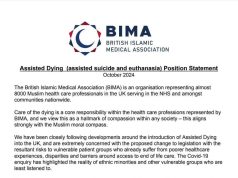20 April 2020 / 26 Sha’ban 1441
COVID-19 – Guidelines for patients during Ramadhan.
by Dr Musa Mohd Nordin
As at 20 April 2020, there were 2.4 million cases of COVID-19. 166,000 have since died.
The elderly person, the immunosuppressed and those with co-morbidities are at
highest risk of severe coronavirus infections and deaths.
It is within this context that this general guidelines have been issued, in consultation
with religious scholar to ease the burden upon the sick, the infirmed and the
vulnerable subset of our population.
This is in accordance with Allah SWT revelations in Surah Al-Hajj 22:78; “And strive for
Allah with the striving due to Him. He has chosen you and has not placed upon you in
the religion any difficulty.”
One of the core maxims of Islamic Jurisprudence (Al-Qawa’id al-Fiqhiyyah) stipulates
“hardship begets facility” (Al-mashaqqah tajlib al-taysir). Facilitation is one of the
objectives of the shari’ah (maqasid as-shari’ah) and in the face of harm and hardship it
is allowed to alleviate the effect of hardship and facilitate some degree of relief or
ease (taysir) through concessions and allowances (rukhas) to lighten the burden.
And we firmly believe this spirit and approach pervades the corpus of the
jurisprudence of facilitation (Fiqh Taysir). And at no point it time does it blemish the
belief nor practise of the faithful because the scholars have anticipated these
challenges of modernity and have reiterated, “Allah will bless the believer who
recognises and engages with the new world, yet remains true to his religious values.”
The following Islamic guidelines may be useful in such challenging conditions:
1. Patients who are advanced in age, are immunosuppressed, have other co-morbidities
or other risk factors as diagnosed by the attending physician, may be advised to avoid
the fast in Ramadhan.
2. Patients who are at higher risk of acquiring an infection or co-infection maybe advised
to avoid fasting.
3. Patients with severe cough and fever may also avoid or break their Ramadhan fast.
Whether he chooses to do so is dependent on his physical tolerance.
4. COVID-19 positive patients should be strongly advised not to fast.
5. Taraveeh prayers, though highly desirable, it is not obligatory (Faradh). It should be
offered at home with family members.
6. In the presence of the overwhelming circumstances of the COVID-19 pandemic,
communal prayers either in Taraveeh and Eid should be strictly avoided to prevent the
spread of the COVID-19 virus.
7. To apply the principles of physical distancing, which was historically practised by Amr
ibn al-As, the commander of the Muslim army, during the plague of Amwas 17AH (638
AD). He directed the soldiers to break camp and self-isolate in small groups in the hills
and only allowed them to congregate after the plague was over.
8. Thus during this extreme COVID-19 circumstances, Ramadhan gatherings such as iftar
in mosques, or other places such as tents, or homes or other group activities is not
advised.
9. Visits to relatives and friends on the occasion of Eid must be avoided.
Finally we are reminded of the practice of the Prophet (peace be upon him) whom
A’isha reported as the following: “Whenever the Messenger of Allah was given a
choice between two things, he chose the easier one unless it was a sin.” (Sahih
al-Bukhari and Muslim)
We pray to Allah (SWT) that He will bring this pandemic to a prompt conclusion. And
that He will protect us from the scourges of COVID-19. And that He will ease us
in our daily duties to seek His pleasure.











